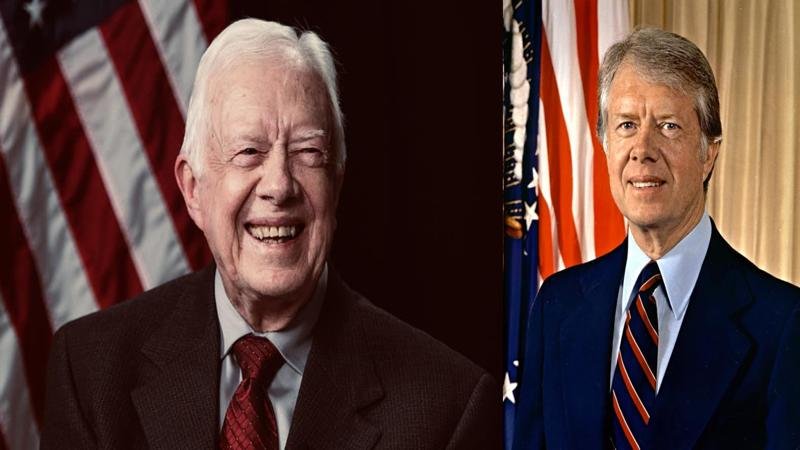
Jimmy Carter, the 39th President of the United States, passed away on December 29, 2024, at the age of 100 in his hometown of Plains, Georgia. His death marked the end of a remarkable life dedicated to public service, humanitarian efforts, and the pursuit of peace. Carter’s passing was met with tributes from world leaders and citizens alike, recognizing his contributions to American history and global diplomacy.
Early Life and Political Beginnings
Born on October 1, 1924, in Plains, Georgia, James Earl Carter Jr. grew up in a modest farming family. His father, James Earl Carter Sr., was a businessman and peanut farmer, while his mother, Lillian Carter, was a nurse. The values instilled in him from a young age played a crucial role in shaping his later career.
Carter graduated from the United States Naval Academy in 1946 and served as a naval officer, specializing in nuclear submarine programs. After his father’s death in 1953, he returned to Georgia to manage the family’s peanut farm. His foray into politics began in 1963 when he was elected to the Georgia State Senate. By 1970, he became the Governor of Georgia, advocating for civil rights and government transparency.
Presidency (1977-1981): Key Achievements and Challenges
Carter’s presidency was marked by both notable achievements and significant challenges. In 1976, he defeated Gerald Ford in a close election, presenting himself as a Washington outsider who could restore trust in government after the Watergate scandal.
Key Achievements
- Camp David Accords (1978) – Carter brokered a historic peace agreement between Egypt and Israel, which remains one of his most significant diplomatic accomplishments.
- Energy Policies – Carter promoted energy conservation and the development of alternative energy sources to reduce reliance on foreign oil.
- Human Rights Advocacy – His administration emphasized human rights, cutting ties with oppressive regimes and prioritizing ethical foreign policies.
- Department of Education & Department of Energy – Carter established these departments to improve federal oversight in critical areas.
- Environmental Protections – Carter expanded national parks, protected millions of acres in Alaska, and promoted environmental conservation.
- Healthcare Initiatives – Though his push for national healthcare reform faced resistance, Carter laid the groundwork for future improvements in American healthcare policy.
Challenges & Setbacks
- Iran Hostage Crisis (1979-1981) – 52 Americans were taken hostage in Iran for 444 days, severely affecting his approval ratings.
- Economic Struggles – High inflation, unemployment, and energy shortages led to economic stagnation.
- 1979 Oil Crisis – Caused by political instability in the Middle East, leading to rising fuel prices and public frustration.
- Soviet Invasion of Afghanistan (1979) – Carter imposed sanctions on the USSR and boycotted the 1980 Moscow Olympics in response, escalating Cold War tensions.
These challenges contributed to Carter’s defeat in the 1980 election to Ronald Reagan.
Post-Presidency: A Legacy of Humanitarianism
After leaving the White House, Carter dedicated his life to humanitarian work, making his post-presidency one of the most impactful in U.S. history.
The Carter Center (1982)
In 1982, he founded The Carter Center, a non-profit organization focused on global health, democracy promotion, and conflict resolution. The center played a key role in:
- Eradicating Guinea worm disease, reducing cases from 3.5 million in 1986 to fewer than a dozen in 2024.
- Observing elections in over 100 countries to ensure free and fair democratic processes.
- Advancing human rights worldwide.
- Combating neglected tropical diseases and improving public health infrastructure in developing nations.
Nobel Peace Prize (2002)
Carter was awarded the Nobel Peace Prize in 2002 for his work in diplomacy and human rights, becoming one of the most respected figures in international peace efforts.
Habitat for Humanity
Carter and his wife, Rosalynn Carter, were actively involved in Habitat for Humanity, building homes for underprivileged families well into their 90s. Their efforts directly impacted thousands of families and promoted affordable housing globally.
Advocacy for Mental Health
Rosalynn Carter, with Jimmy’s support, was a leading advocate for mental health awareness. Together, they worked to improve mental health policies and reduce the stigma surrounding mental illness in the U.S.
Final Years and Death
In February 2023, Carter entered hospice care, opting to spend his final days at home with his family in Plains, Georgia. His decision was widely respected, as he had lived a long and fulfilling life.
He passed away on December 29, 2024, at 100 years old. The announcement of his death led to an outpouring of tributes from political figures, humanitarian organizations, and world leaders. President Joe Biden called Carter “a man of great integrity and compassion.”
Funeral Services and National Mourning
Carter was honored with a state funeral, a tradition reserved for prominent national leaders. His casket lay in state at the U.S. Capitol, allowing the public to pay their respects.
A National Day of Mourning was declared, and a funeral service was held at the Washington National Cathedral on January 9, 2025. Carter was then laid to rest in Plains, Georgia, next to his wife, Rosalynn, who had passed away earlier in 2023.
Memorial Tributes
- Global Leaders paid homage to Carter, acknowledging his impact on peace and diplomacy.
- Humanitarian Organizations highlighted his contributions to disease eradication and human rights.
- American Citizens remembered him for his honesty, humility, and commitment to serving the people.
- Educational Institutions honored Carter’s commitment to public service by establishing scholarships in his name.
- Environmental Groups celebrated his dedication to climate protection and sustainable energy.
Legacy and Impact
Jimmy Carter’s legacy is defined not just by his presidency but by his lifelong commitment to peace, democracy, and humanitarian work. His impact is felt across various fields:
- Politics – Advocated for ethical governance and democracy.
- Diplomacy – Helped resolve conflicts and promote peace worldwide.
- Health – Instrumental in disease eradication efforts.
- Social Justice – Fought for civil rights and equality.
- Environment – Established conservation policies that continue to protect American lands and wildlife.
- Volunteerism – Inspired millions to engage in service-oriented work through Habitat for Humanity and The Carter Center.
His commitment to peace, equality, and service continues to inspire leaders, activists, and everyday citizens to strive for a better world.
Conclusion
Jimmy Carter’s passing marks the end of an era, but his legacy lives on. Whether as a President, humanitarian, or global advocate for peace, Carter will be remembered as one of the most influential figures in modern history. His work and values continue to shape the world today.



